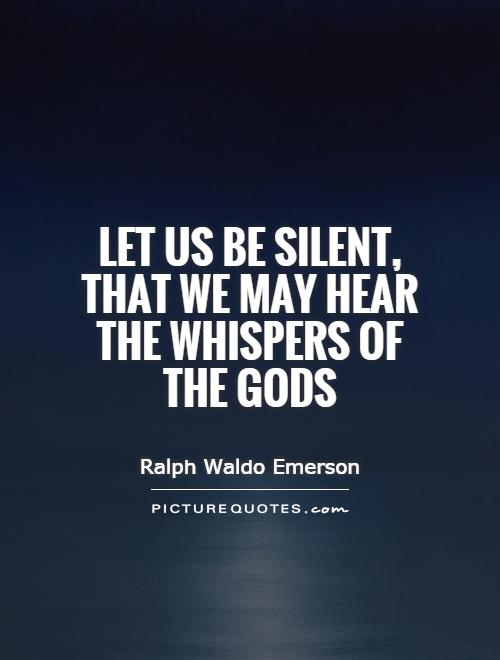Let us be silent, that we may hear the whispers of the gods

Let us be silent, that we may hear the whispers of the gods
Ralph Waldo Emerson, a prominent figure in the transcendentalist movement of the 19th century, believed in the power of silence as a means of connecting with the divine. In his essay "Self-Reliance," Emerson famously wrote, "Let us be silent, that we may hear the whispers of the gods." This statement encapsulates Emerson's belief in the importance of quiet contemplation and introspection in order to gain insight and wisdom from the spiritual realm.Emerson believed that in the hustle and bustle of everyday life, people often become distracted by the noise and chaos of the world around them. In order to truly connect with the divine and gain a deeper understanding of oneself and the universe, Emerson argued that it was necessary to cultivate a sense of inner stillness and silence. By quieting the mind and tuning out external distractions, one could open themselves up to the subtle messages and guidance of the gods.
For Emerson, the whispers of the gods were not loud or forceful, but rather gentle and subtle. They could only be heard by those who were willing to listen with an open heart and a quiet mind. In this way, Emerson believed that silence was not a sign of weakness or passivity, but rather a powerful tool for self-discovery and spiritual growth.
Emerson's emphasis on the importance of silence and introspection is a central theme in his philosophy of transcendentalism. Transcendentalists believed in the inherent goodness of humanity and the interconnectedness of all living beings. By quieting the mind and listening to the whispers of the gods, Emerson believed that individuals could tap into this universal consciousness and gain a deeper understanding of their place in the world.












 Friendship Quotes
Friendship Quotes Love Quotes
Love Quotes Life Quotes
Life Quotes Funny Quotes
Funny Quotes Motivational Quotes
Motivational Quotes Inspirational Quotes
Inspirational Quotes